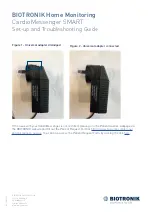
BIOTRONIK CardioMessenger SMART
Set-up and Troubleshooting Guide
1. Remove from the box and plug your BIOTRONIK CardioMessenger SMART into a power
socket within 15cm to 2.5m of where you sleep.
2. An ‘OK’ symbol will appear on the left side of the screen once the CardioMessenger is
charged and fully-functioning.
3. Ensure your CardioMessenger remains plugged in 24/7. You do not need to carry it with
you during the day.
4. No further set up is required. The CardioMessenger will transmit medical messages
from your device automatically every night between 1am to 2am.
5. If you are admitted to hospital, please bring this monitor and cable with you. Please take
monitor with you after hospital discharge and repeat step 1, 2, 3 & 4
The CardioMessenger is not an emergency system or life saving device. If you have symptoms or
are feeling unwell, you must see your doctor or call Triple Zero (000) in a medical emergency.
Setting up your CardioMessenger SMART
Commonly Asked Questions
BIOTRONIK Home Monitoring
CardioMessenger SMART
Set-up and Troubleshooting Guide
Do I need to bring my CardioMessenger when I travel?
Please ask your doctor. In general, we recommend you bring your CardioMessenger and plug it in
next to where you sleep if you are travelling for a period greater than 3 weeks.
If you have a diagnostic device, such as a BioMonitor (Implantable Loop Recorder) it is advisable to
bring your CardioMessenger with you travelling.
For more information about travelling overseas or if you do not wish to bring your CardioMessenger
while travelling, please fill out the Patient Request Form
here
and include the dates of your travel.
Please note
Your Implantable Cardiac Device will not transmit medical messages while you are away from the
CardioMessenger. If you intend to be away from your CardioMessenger for a period of 60 days or
greater, you may need to make an appointment to have your BIOTRONIK Remote Monitoring
manually reactivated in your doctor’s clinic on your return. This does not apply to patients with
implantable defibrillators. Monitoring will remain active on these devices.





















